
Research
NPM targeted by malware campaign mimicking familiar library names
Socket uncovered npm malware campaign mimicking popular Node.js libraries and packages from other ecosystems; packages steal data and execute remote code.
@zaadevofc/spreadsheet-db
Advanced tools
Using Spreadsheet as a fast and efficient SQL Database alternative
Using Google Sheets API as a fast and efficient SQL Database alternative, just kidding :/ full thanks for library support by ❤️ google-spreadsheet ❤️
xlsx,ods,tsv,csv,pdf,zipDocs - Meanwhile, currently the documentation is only in the readme file for this library https://github.com/zaadevofc/spreadsheet-db#readme
🔥 Installation -
npm i @zaadevofc/spreadsheet-db --saveoryarn add @zaadevofc/spreadsheet-db
first of all, we need the
private_keyandclient_emailfrom your Service account, follow the steps below:
and you must enable sheets APi :
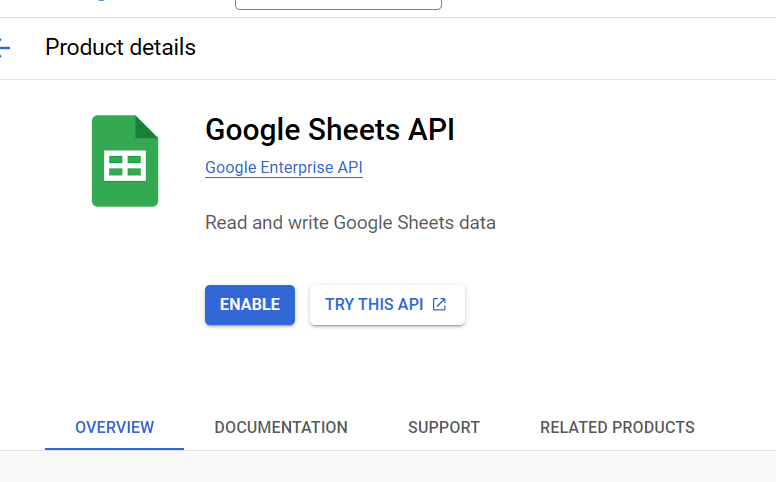
your credentials more or less will look like this :
{
"type": "",
"project_id": "",
"private_key_id": "",
"private_key": "",
"client_email": "",
"client_id": "",
"auth_uri": "",
"token_uri": "",
"auth_provider_x509_cert_url": "",
"client_x509_cert_url": "",
"universe_domain": ""
}
this library only requires private_key and client_email properties. so you can save the file safely, and put the required properties into the .env file
Note - you have to create a spreadsheet first on the Google Sheets page and you have to update its privacy to public and be allowed to edit it
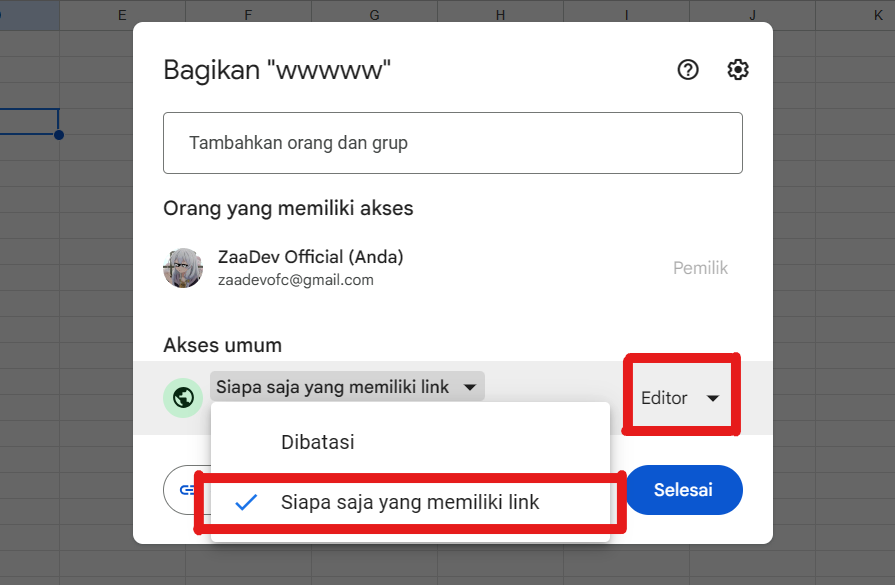
later we will register your spreadsheets ID, below is where the ID is located :

const SpreadDB = require('@zaadevofc/spreadsheet-db')
const spreadDB = new SpreadDB({
client_email: process.env.SERVICE_CLIENT_EMAIL,
private_key: process.env.GOOGLE_PRIVATE_KEY
});
Note - To keep the examples concise, I'm calling await at the top level which is not allowed by default in most versions of node. If you need to call await in a script at the root level, you must instead wrap it in an async function like so:
(async () => {
// async function here
})()
const db = await spreadDB.register(/* your spreadsheets id */)
// if you want to use multiple id
const db1 = await spreadDB.register(/* your spreadsheets id */)
const db2 = await spreadDB.register(/* your spreadsheets id */)
Note - the sheet display is something like this :

await db.addSheet(/* name your new sheet */)
// example
await db.addSheet('users')
the changes will look like this:

Note - i recommend that you create a header first before giving it a value with this program, you can see the example below:
you must place the header starting from column A1 and add at least 1 value so that the program follows the previous style
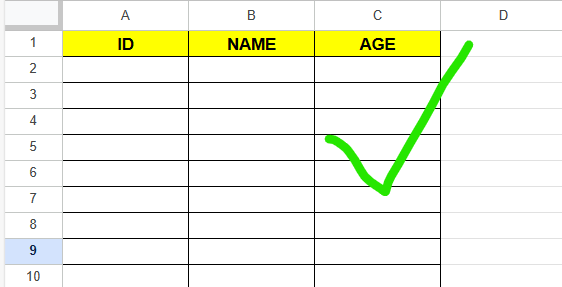
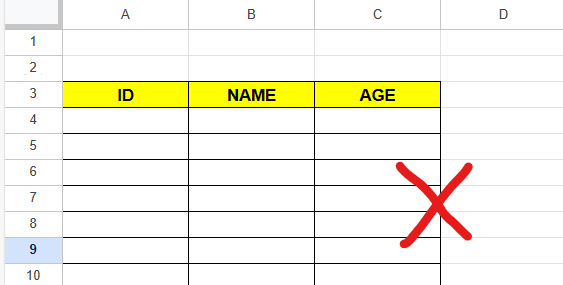
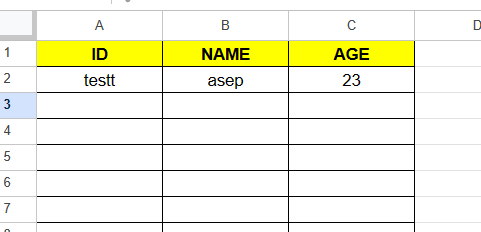
code :
// add multiple value
await db.addValue('users', [
[12345, 'alex', 12],
[12346, 'dodo', 18],
[12347, 'adit', 22],
]);
result :
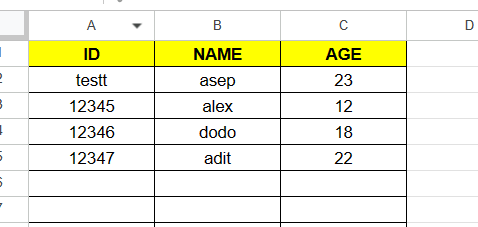
the contents of the array depend on how many rows there are in your header
| ID | NAME | AGE | HOBBY | WORK |
|---|---|---|---|---|
| array[0] | array[1] | array[2] | array[3] | array[4] |
await db.addValue('users', [
[/* value array [0] */, /* value array [1] */, /* value array [2] */, /* value array [3] */, /* value array [4] */],
]);
example table :
| ID | NAME | AGE |
|---|---|---|
| 1 | jamal | 23 |
| 2 | rosyid | 20 |
| 3 | ditha | 21 |
| 4 | keja | 25 |
with this function :
await db.deleteLatestRows(/* your sheet title/name */);
//example
await db.deleteLatestRows('users');
later it will be like this :
| ID | NAME | AGE |
|---|---|---|
| 1 | jamal | 23 |
| 2 | rosyid | 20 |
| 3 | ditha | 21 |
example table :
| ID | NAME | AGE |
|---|---|---|
| 1 | jamal | 23 |
| 2 | rosyid | 20 |
| 3 | ditha | 21 |
| 4 | keja | 25 |
await db.deleteRowsByCriteria(/* your sheet title/name */, {
key: /* this key alias the header */,
value: /* value of key */
});
// example
await db.deleteRowsByCriteria('users', {
key: 'AGE',
value: 20
});
result :
| ID | NAME | AGE |
|---|---|---|
| 1 | jamal | 23 |
| 3 | ditha | 21 |
| 4 | keja | 25 |
this function will delete a sheet based on existing properties:
await db.deleteSheetById(/* your sheet id */);
await db.deleteSheetByIndex(/* your sheet index */);
await db.deleteSheetByTitle(/* your sheet name/title */);
example table :
| ID | NAME | AGE |
|---|---|---|
| 1 | jamal | 23 |
| 2 | rosyid | 20 |
| 3 | ditha | 21 |
| 4 | keja | 25 |
await db.updateRowsByCriteria('users',
{
key: 'NAME',
value: 'ditha'
},{
update_key: 'AGE',
update_value: 32
})
result :
| ID | NAME | AGE |
|---|---|---|
| 1 | jamal | 23 |
| 2 | rosyid | 20 |
| 3 | ditha | 32 |
| 4 | keja | 25 |
this is doc title/name :
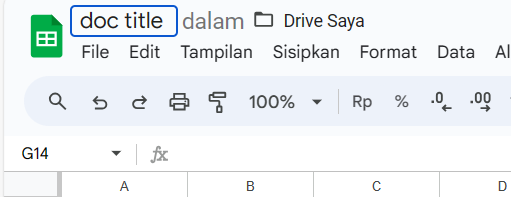
this is sheet title/name :

you can use the code below :
db.changeDocTitle(/* new doc title/name */);
db.changeSheetTitleByTitle(/* sheet title/name */, /* new sheet title/name */);
db.changeSheetTitleById(/* sheet id */, /* new sheet title/name */);
db.changeSheetTitleByIndex(/* sheet index */, /* new sheet title/name */);
fetching all data from your doc :
db.getData()
//=> result :
{
title: '',
locale: '',
autoRecalc: '',
timeZone: '',
sheetCount: 0,
spreadsheetId: '',
spreadsheetUrl: '',
googleDriveUrl: '',
rawSheets: [],
}
//=> rawSheets :
{
sheetId: 0,
title: '',
index: 0,
sheetType: '',
spreadsheetUrl: '',
rowCount: 0,
columnCount: 0,
headerRowIndex: 0,
contentCounts: 0,
contents: [],
}
//=> contents :
the
contentsof the content property depend on the contents of your sheet, I give an example using a table like this:
| ID | NAME | AGE |
|---|---|---|
| 1 | jamal | 23 |
| 2 | rosyid | 20 |
| 3 | ditha | 32 |
| 4 | keja | 25 |
result of property contents :
{
{ index: 0, id: '1', name: 'jamal', age: '23' },
{ index: 1, id: '2', name: 'rosyid', age: '20' },
{ index: 2, id: '3', name: 'ditha', age: '32' },
{ index: 3, id: '4', name: 'kejaa', age: '25' }
}
this will return a data sheet based on existing properties:
db.getAllSheets();
db.getSheetByIndex(/* your sheet index */);
db.getSheetById(/* your sheet id */);
db.getSheetByTitle(/* your sheet title */);
this will return a sheet contents based on existing properties:
db.getAllContents();
db.getContentByIndex(/* your sheet index */);
db.getContentById(/* your sheet id */);
db.getContentByTitle(/* your sheet title */);
This module was written and is actively maintained by zaadevofc. If you want to develop this module, you can do that because this module is free and open source
Want to help support it? Buy me inspiration Saweria
This is free and unencumbered public domain software. For more info, see https://unlicense.org.
FAQs
Using Spreadsheet as a fast and efficient SQL Database alternative
The npm package @zaadevofc/spreadsheet-db receives a total of 13 weekly downloads. As such, @zaadevofc/spreadsheet-db popularity was classified as not popular.
We found that @zaadevofc/spreadsheet-db demonstrated a not healthy version release cadence and project activity because the last version was released a year ago. It has 1 open source maintainer collaborating on the project.
Did you know?

Socket for GitHub automatically highlights issues in each pull request and monitors the health of all your open source dependencies. Discover the contents of your packages and block harmful activity before you install or update your dependencies.

Research
Socket uncovered npm malware campaign mimicking popular Node.js libraries and packages from other ecosystems; packages steal data and execute remote code.

Research
Socket's research uncovers three dangerous Go modules that contain obfuscated disk-wiping malware, threatening complete data loss.

Research
Socket uncovers malicious packages on PyPI using Gmail's SMTP protocol for command and control (C2) to exfiltrate data and execute commands.